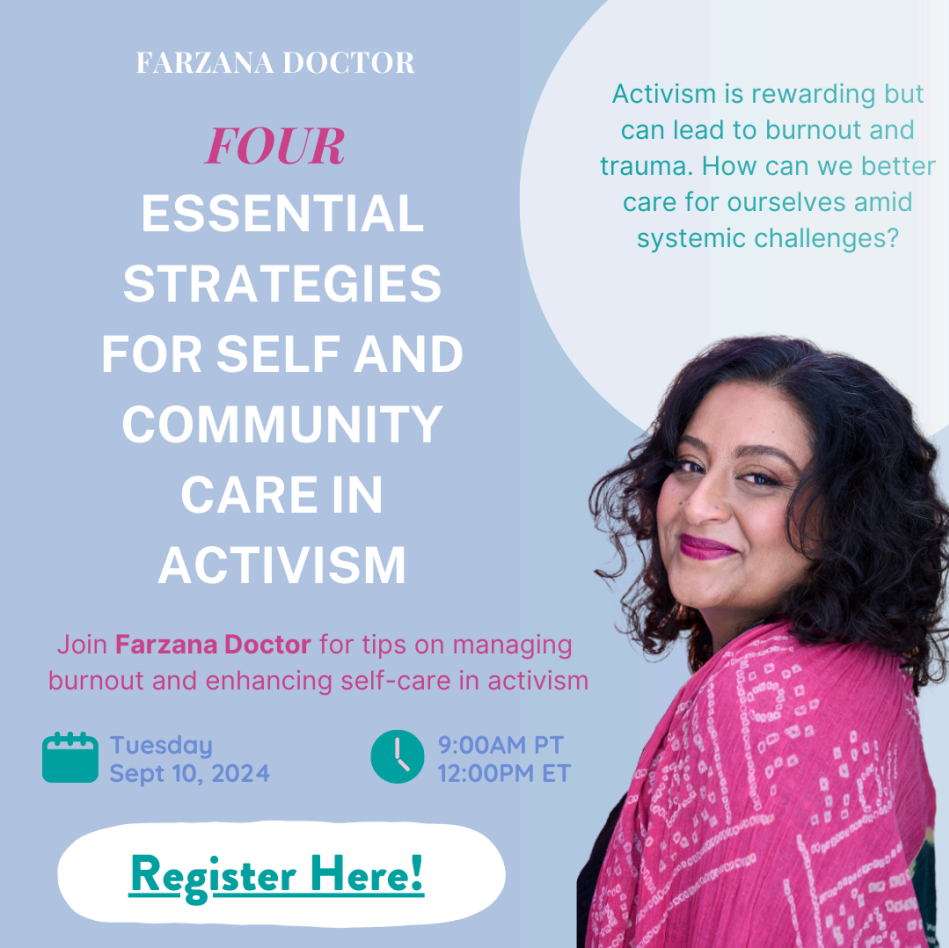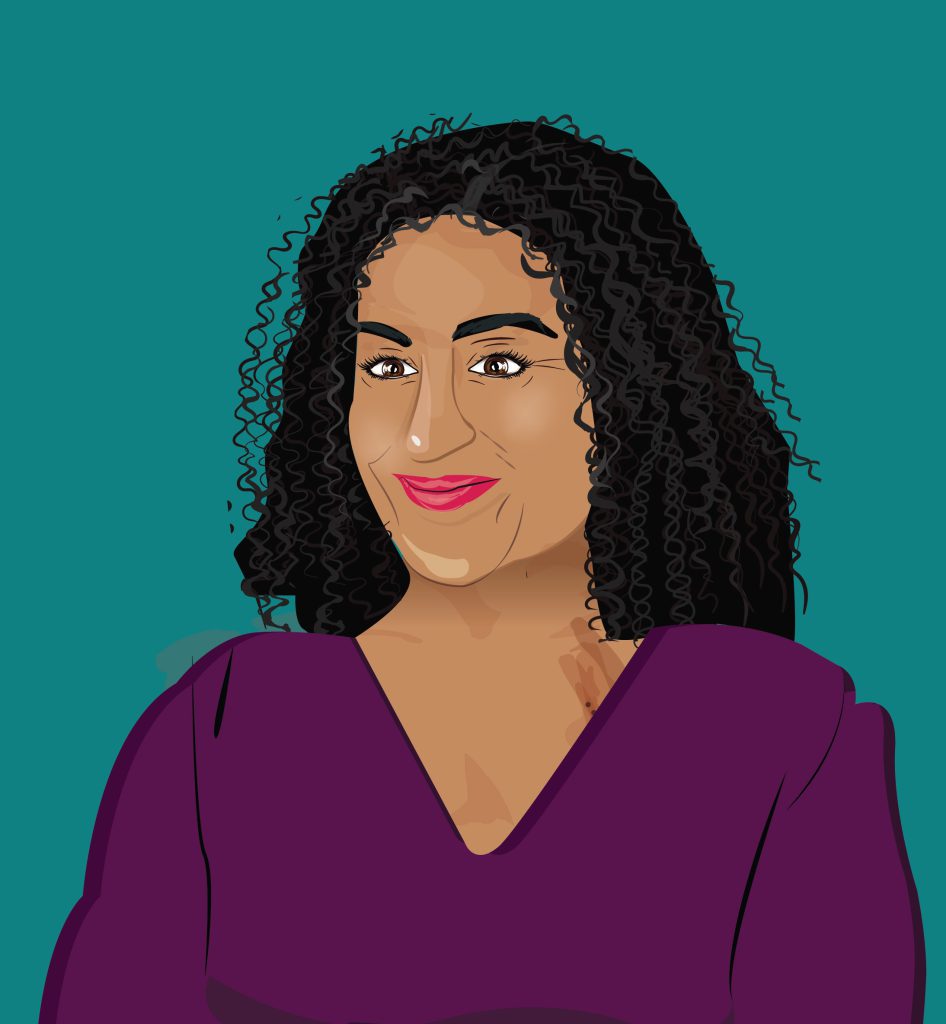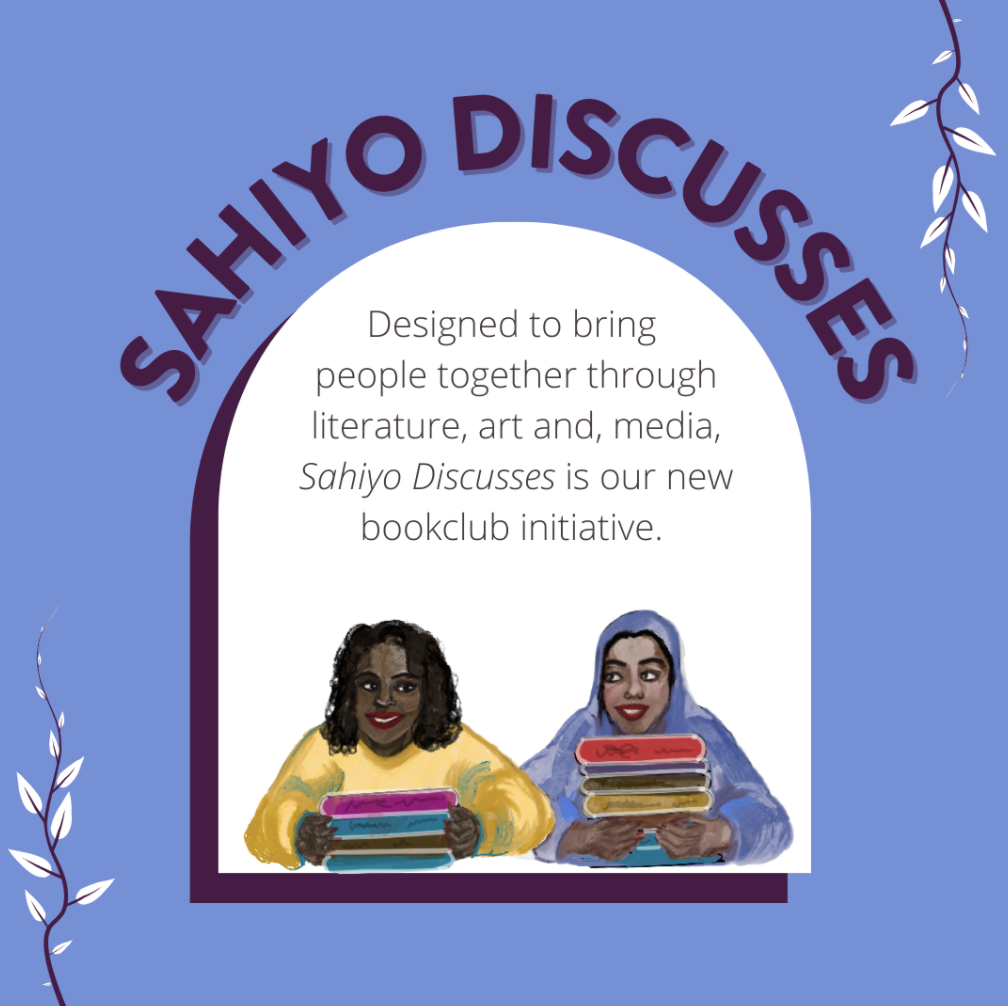“Four Essential Strategies for Self and Community Care in Activism” Event with Farzana Doctor on September 10th

Sahiyo U.S. and the U.S.End FGM/C Network invite you to join our upcoming event, “4 Essential Strategies for Self and Community Care in Activism.” This event is free to attend, but we invite you to make a meaningful contribution to support the FGM/C Policy Advocate Care Fund today. Date: Tuesday, September 10, 2024 Time: 9-10 am PT / 12-1 pm ET Platform: Virtual – Zoom Registration Link: bit.ly/CareForActivists Description: Farzana Doctor, an activist, social worker, Sahiyo blog contributor, and author, will share practical strategies to help reduce stress, fatigue, and vicarious trauma, offering actionable ideas to bring more self and community care into the lives and work of those working for social change. While activism is incredibly rewarding, it can also be demanding and overwhelming. The dedication to addressing global injustices can often lead to burnout, vicarious trauma, and self-doubt. Many of these problems arise due to systemic issues, such as underfunding in the activism sector, oppression, and ongoing global crises. This event aims to equip individuals with tools to prioritize their well-being while doing the invaluable work of supporting and protecting people and communities. Don’t miss this important opportunity to learn and engage in a conversation about sustaining activism while maintaining your well-being. About the FGM/C Policy Advocate Care Fund: We’re excited to announce this event is being held to also support the newly established FGM/C Policy Advocate Care Fund, a joint initiative by Sahiyo U.S. and the U.S. End FGM/C Network. This fund is dedicated to empowering advocates and survivors who work relentlessly to address FGM/C in their communities to gain the resources and support they need to actively engage in education and policy advocacy. Our goal is to ensure these advocates are fairly compensated and honored for their invaluable contributions, addressing the gaps in funding and acknowledgment they too often face. Support FGM/C Policy Advocates! Donate today!
Dear Maasi: How can I stop the trauma of FGM/C from popping into my mind?

Dear Maasi is a column about everything you wanted to know about sex and relationships but were afraid to ask! It’s a partnership between Sahiyo and WeSpeakOut, and is for all of us who have questions about khatna (female genital mutilation/cutting or FGM/C) and how it impacts our bodies, minds, sexualities and relationships. We welcome you to submit your anonymous questions. Dear Maasi, Although I’ve emotionally resolved much about the FGM/C trauma through therapy, there are times when it pops into my mind in an unexpected way, for example, the odd time when I’m urinating. It might be a depressing thought, or a prickly pain down there. At these moments, I feel awful and sad, and angry that FGM/C can still intrude upon my life. How can I stop it? —Mariam Dear Mariam, Thank you for this important question. Sometimes our FGM/C trauma and their triggers can feel difficult to understand. In my April 2021 column, I talked about this: “Trauma memories are often implicit, because trauma floods our brain with cortisol, the stress hormone, which shuts down the part of our brain that encodes memories and makes them explicit. Our implicit memories can be like invisible forces in our lives, impacting us in powerful ways.” (https://www.psychalive.org/making-sense-of-implicit-memories/) These “invisible forces” show up in the ways you’ve described, in those seemingly random moments when you’re not expecting them to. Trauma impacts both our mind and body and can keep our nervous systems on alert for perceived threats, even when there is no actual threat present. Frustrating right? I am not sure that we can stop it, but we can lessen the suffering. One powerful strategy is mindfulness, which originated in eastern and Buddhist philosophy and uses moment-to-moment awareness to cope and reduce distress. Mindfulness has helped me when I have uncomfortable thoughts, feelings, or bodily experiences. For example, when I feel discomfort in my genitals, I have learned (with a therapist’s help, reading, and lots of practice) to respond to it as a neutral sensation. The goal is to acknowledge the sensation without reacting negatively. How we respond and talk to ourselves matters. -I might say “Oh! There’s that sensation in my vulva” or “Oh! There’s that memory” versus “Oh! There’s that awful/weird/unpleasant pain” or “Oh! There’s that horrible memory that will never go away”. -I’ll then breathe into the sensation or memory, and send love to my body or mind. When I first tried this exercise, it didn’t work immediately, or feel believable; in time, with lots of repetition, it started to work. This is because the repetitive practice builds new neural networks that allow us to have new responses. One way to remember to practice is to post a picture or words that will help you remember. Mariam, in your case, you could post this reminder in the bathroom, right across from the toilet. Hope this helps, Mariam. And as always, remember that sexual pleasure and healing is our birthright! —Maasi About Maasi, aka Farzana Doctor: Farzana is a novelist and psychotherapist in private practice. She’s a founding member of WeSpeakOut and the End FGM/C Canada Network. She loves talking about relationships and sexuality! Find out more about her at http://www.farzanadoctor.com Disclaimer: While Farzana is full of good advice, this column won’t address everyone’s individual concerns and should not be used as a substitute for professional medical or psychological care.
Sahiyo Discusses: You Still Look the Same, a discussion with Farzana Doctor

In our latest Sahiyo Discusses event, which took place on September 21st, we were joined by Farzana Doctor, to discuss her newly released poetry book, You Still Look the Same. A profoundly moving collection of poems, Farzana explores multiple themes and includes a section on being a survivor of female genital cutting (FGC). At the event itself we listened to her poetry, which was subsequently followed by a discussion and questions for Farzana, focusing on methods for healing grief and trauma, alongside her process for writing such personal insights into her life. Farzana is a writer, activist and psychotherapist, currently volunteering with WeSpeakOut, a global group that works to end FGC in her community and also writes for Sahiyo’s Dear Maasi, a sex and relationships column on Sahiyo’s blog for FGC survivors. Evident in her ‘agony aunt’ style responses, as well as her poetry, Farzana is not afraid to shine light on difficult and painful topics: the pain of heart break and dating at middle-age, cultural and familial responses to her same sex relationship, and misogyny and racism that has followed her from childhood. Though heart-wrenching and emotionally stirring, Farzana’s voice also rings with humour and strength, holding the ability to switch between light-hearted anecdotes about online dating and a fiery condemnation of those who stand by and silently watch FGC take place. Sahiyo believes storytelling to be an important part of the work to end FGC, simultaneously uplifting survivors’ experiences to give them a voice while increasing awareness and conversations around the practice to end it. Farzana’s writing is a brilliant example of this, and we thank her for joining Sahiyo Discusses and giving us the opportunity to talk with her about her work and experiences. Thank you to everyone who came and donated. Follow these links if you are still interested in donating to Sahiyo or reading Farzana’s poetry collection.
Sahiyo Discusses book club holds next event in September

Event: Sahiyo Discusses: You Still Look the Same by Farzana Doctor Date: September 21, 2022 Time: 7:00 PM EST Registration Link: https://bit.ly/SahiyoDiscusses Sahiyo invites you to join the next iteration of Sahiyo Discusses! Designed to bring people together through literature, art, and media, Sahiyo Discusses hosts quarterly meetings with activists and allies in Sahiyo’s network to discuss a chosen piece of media. With themes including feminism, equality, bodily autonomy, women-centered movements, and sexual empowerment, this club will focus on uplifting the stories and experiences of women everywhere. On September 21, 2022 the group will meet virtually for Sahiyo Discusses: You Still Look the Same by Farzana Doctor. Farzana Doctor is a writer, activist, and psychotherapist. She currently volunteers with WeSpeakOut, a global group that is working to ban female genital cutting (FGC) in her Dawoodi Bohra community, and is a co-founder of the End FGM Canada Network. Farzana is also behind Dear Maasi, a sex and relationships column on Sahiyo’s blog for FGC survivors. Her newest collection of poetry, You Still Look the Same, is both an intimate deep-dive and a humorous glance at the tumultuous decade of her forties. Through crisp and vivid language, Doctor explores mid-life breakups and dating, FGC, imprints of racism and misogyny, and the oddness of sex and love; she urges us to take a second look at the ways in which human relationships are never what we expect them to be. Sahiyo Discusses members will have the opportunity to discuss this book with Farzana and ask pertinent questions. Admission to Sahiyo Discusses is based on a suggested minimum donation of $25.00 USD per event. Donors who contribute $100 or more will have access to Sahiyo Discusses events for a full calendar year. If you or anyone in your network is interested in joining us please register and donate here: https://bit.ly/SahiyoDiscusses Thank you all for your continued dedication to Sahiyo’s mission, and we look forward to seeing you all there! In Her Own Words: Farzana Doctor’s Full Bio Farzana Doctor is a writer, activist, and psychotherapist. Her ancestry is Indian, and she was born in Zambia while her family was based there for five years, before immigrating to Canada in 1971. She became interested in community organizing as a teen (primarily environmental issues, gender violence, and LGBTTTIQ rights). From 2009-18, she curated the Brockton Writers Series and has been a volunteer with The Writers’ Union of Canada and the Writers’ Trust. She currently volunteers with WeSpeakOut, a global group that is working to ban female genital cutting in her Dawoodi Bohra community. Farzana is also behind Dear Maasi, a sex and relationships column on Sahiyo’s blog for FGC survivors. She co-founded the End FGM Canada Network. She studied social work in the early nineties and has been a social worker ever since. She worked in a variety of community agencies and a hospital before starting part-time private practice, where she sees individuals and couples. She has been writing all of her life but it became a more regular practice around 2000, when she began writing her first novel, Stealing Nasreen, which was published by Inanna in 2007. Her second novel, Six Metres of Pavement, won a 2012 Lambda Literary Award and was short-listed for the 2012 Toronto Book Award. In 2017 it was voted the One Book One Brampton 2017 winner. Her third novel, All Inclusive was a Kobo 2015 and National Post Best Book of the Year. Her fourth novel, Seven was chosen for many 2020 Best Book lists and shortlisted for the Trillium and Evergreen Awards. Her poetry collection, You Still Look The Same, was just released in May 2022. While all her books are distinct from one another, some common themes include loss, relationships, community, healing, racism, LGBT rights, diasporic identity, and feminism. She seamlessly blends strong stories with social justice issues. She has just finished work on a YA novel and is editing a new self-care workbook. She is represented by Rachel Letofsky of CookeMcDermid. She’s an amateur Tarot card reader and has a love of spirituality, energy psychology, hypnosis, and neuroscience. She lives with her partner and dog near the lake in South Etobicoke, the traditional territory of the Haudenosauneega, Anishinabek, and Huron-Wendat peoples.
